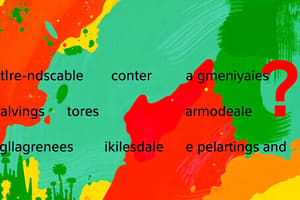Podcast
Questions and Answers
Which of the following is a common noun in Afrikaans?
Which of the following is a common noun in Afrikaans?
- Soshanguve
- Tafel (correct)
- Hlako
- 'n klas leerling. (correct)
What type of noun is 'Soshanguve'?
What type of noun is 'Soshanguve'?
- Proper Noun (correct)
- Common Noun
- Pronoun
- Collective Noun
Which example represents a collective noun?
Which example represents a collective noun?
- Die pad is lank.
- 'n klas leerling. (correct)
- Dit reën.
- Sy werk in die restaurant.
What is the function of auxiliary verbs in Afrikaans?
What is the function of auxiliary verbs in Afrikaans?
Which of these is an interrogative pronoun?
Which of these is an interrogative pronoun?
What is the correct English translation of 'skryf'?
What is the correct English translation of 'skryf'?
Which of the following demonstrates an attributive adjective?
Which of the following demonstrates an attributive adjective?
In the phrase 'dit reën', what type of pronoun is 'dit'?
In the phrase 'dit reën', what type of pronoun is 'dit'?
Study Notes
Nouns
- Nouns in Afrikaans are called "Selfstandige Naamwoorde"
- Common nouns refer to general things, like "Aand" (Evening)
- Proper nouns refer to specific people, places, or things, like "Soshanguve"
- Collective nouns refer to groups of things, like " 'n klas leerling." (a class of students)
Pronouns
- Pronouns are called "Voornaamwoorde" in Afrikaans
- Personal pronouns refer to people, like "Sy/Hulle/Ek" (She/They/I)
- Possessive pronouns show ownership, like "My tante wat koek bak" (My aunt who bakes cakes)
- Interrogative pronouns ask questions, like "Wie weet waar hy woon?" (Who knows where he lives?)
- Impersonal pronouns refer to things that are not people, like "Dit reën" (It is raining)
Adjectives
- Adjectives in Afrikaans are called "Byvoeglike Naamwoord"
- Attributive adjectives describe a noun directly, like " 'n lang pad" (a long road)
- Predicative adjectives describe a noun after a linking verb, like "Die pad is lank" (The road is long)
- Literal adjectives describe something in a straightforward way, like "Die man is arm" (The man is poor)
- Figurative adjectives use metaphors, like "Die arme man is in pyn" (The poor man is in pain)
- Adjectives have degrees of comparison, like "Groot - Groter - Grootste" (big - bigger - biggest)
- Intensifiers make adjectives stronger, like "yskou" (ice-cold)
Verbs
- Verbs in Afrikaans are called "Werkwoorde"
- Independent verbs are verbs on their own, like "Skryf" (to write)
- Auxiliary verbs help other verbs, like "Kan-kon, is, het" (can-could, is, has)
Adverbs
- Adverbs in Afrikaans are called "Bywoorde"
- Adverbs of time describe when something happens, like "gister" (yesterday)
- Adverbs of manner describe how something happens, like "Versigtig" (carefully)
- Adverbs of place describe where something happens, like "Buite" (outside)
- Adverbs of degree describe the intensity of an action, like "Erg" (very)
Studying That Suits You
Use AI to generate personalized quizzes and flashcards to suit your learning preferences.
Description
Test your knowledge of Afrikaans grammar by exploring nouns, pronouns, and adjectives. This quiz covers the distinctions between common, proper, and collective nouns, as well as various types of pronouns and adjectives used in the Afrikaans language. Perfect for learners at any level!




